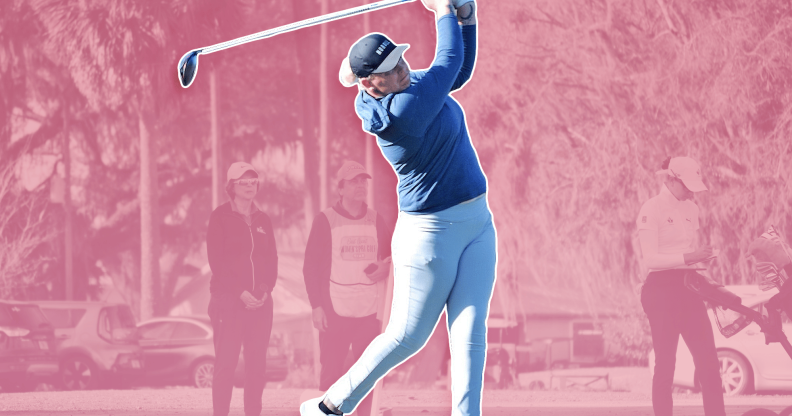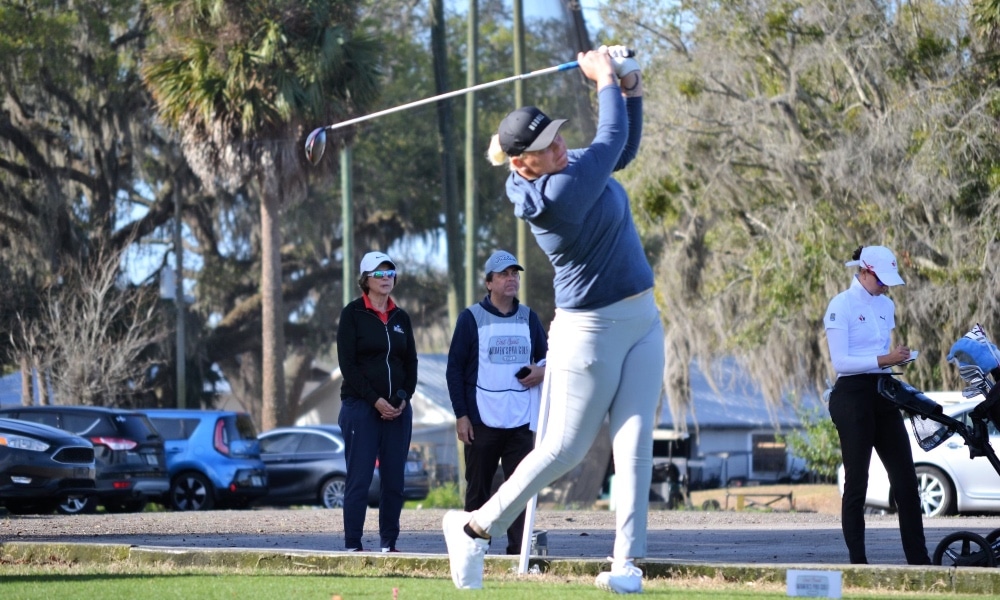Pioneering trans golfer Hailey Davidson addresses Caitlyn Jenner and hate-fuelled transphobes

Hailey Davidson was on track to become the female golfers association’s first trans card-holder. (PinkNews/Hailey Davidson)
That nagging thought always caught up with Hailey Davidson eventually. Even when she told herself it would last a day, two tops, it was always there waiting for her.
There was only one thing she could do to keep it at bay – play golf.
“When I was probably 10 years old, I started to have different thoughts about what may be going on. I turned 30 this year, so for me growing up, you didn’t really know these things,” Davidson tells PinkNews.
“When I started having these thoughts, this went on for a day or two, I’d freak out and then I would go right back to golf but in a more serious way each time.”
Hailey Davidson was trans, something that no matter how much of herself she threw into golf wasn’t going to go away.
“I figured the more I put into golf the more it’ll distract me, the more I’ll never have to worry again. This went on for years,” she says. “I’d assumed it was just a thought I’ll stick in the back of my mind, never think about it again.”
This cycle went on for some time as she hit puberty.
“I was so angry on the golf course, nowhere else, just on the golf course, but it was all stemming from this,” Davidson says. “I figured if I wasn’t perfect on the golf course, I wouldn’t be able to play professionally as a male and then I’d have to address all this other stuff.”
This pressure left her exhausted throughout much of her teenage years. Taking a toll on both her mental health and her golfing performance – two things that, at the time, seemed like the same thing to Davidson.
Davidson always loved golf but she didn’t have many other sporty options. Born in Scotland with backwards feet, Davidson had at least 34 procedures on her ankles as a child. By 1997 when she moved to the US, doing laps around a field or kicking a ball wasn’t really an option.
“But golf is a lazy sport,” she jokes, “in the US, you leisurely sit in a car.”
By aged 13, golf meant represented much more than just a sport.
“It almost became my therapy, I would say mentally and to my feet and ankles,” she says, adding that a note from her doctor getting her out of gym classes was a blessing for her – she really hated running.
“There’s no point in trying any other sport. Even if you get good at it, you just can’t physically do it. So golf stuck with me and because of me getting good at it, playing tournaments, it kind of took over my life.”
Several years later, Hailey Davidson is now the type of person she never thought was possible – an openly trans professional golfer. Today she lives in Kissimmee, Florida and had a strong finish in the first two rounds of the first stage of the Ladies Professional Golf Association is an American (LPGA) and Epson Tour Qualifying School in Palm Springs in August.
Her success predictably touched a nerve among transphobes.
But she’s not the least bit fussed about what hate-fuelled critics think of her – but she was surprised that it had taken them so long to target her.

Hailey Davidson well and truly doesn’t care what you think of her – just as long as you’re willing to listen. (Hailey Davidson)
Davidson attempted the qualifying tournaments in 2021, making it to the fourth and final round but missing out on advancing to Stage II by just four strokes.
This year, she narrowly missed the 54-hole cut after rounds of 70-76-73.
But she has an inkling about why her success this year in the Epsom Tour qualifiers saw trolls flood her Instagram and Fox News articles about her piling up – it’s election season.
“Magically, we seem to care. OK if it was really fitting the narrative they’re trying to push, I wouldn’t even be here in the first place because I would have played so well last year I wouldn’t be here again,” she says.
Anti-trans campaigners continue to peddle the line that trans women have a huge advantage over othe women when it comes to sport. Davidson’s respectable (but hardly triumphant) success suggests otherwise.
“They saw this as an opportunity. I played one decent round in the first stage. I didn’t play great, I played alright but they lost it.”
“I’ve never been exposed to this base of people before. It was a different experience. Compared to maybe 90 per cent of an audience agreeing with who I am, now I’m getting the opposite, 90 per cent really don’t like me not for honest reasons. That’s what bugs me more, I’m OK with people not liking me but if you don’t like me for an honest reason based on truth, understandable, you’re never going to please everyone.
“But people are throwing hate and threats at me based on 100 per cent lies.”
The same lies about Davidson – that her being trans gives her physical advantages over the 106 cis golfers who performed much better than her in the third round – are many of the same lies spouted by Republican state legislators trying to ban trans athletes. Or by sports governing bodies moving to restrict or prohibit altogether trans athletes.
Experts say that stopping all trans people from playing sports alongside their cis counterparts is a solution to a problem that doesn’t exist. Scientists haven’t exactly spent a lot of time looking at trans women performing in elite sports mainly because they’re so few and far between – out of 200,000 women’s college sportspeople, around 50 are trans, according to one researcher’s count.
The science so often pulled up as justification for bans is more to do with the assumed differences between male and female athletes instead and is not even based on “concrete evidence“.
Davidson, after all, was simply playing by the book. Since 2010, the LPGA has welcomed trans women if they have undergone hormonal therapy and gender-affirming surgery, according to the association’s gender policy.
Caitlyn Jenner ‘feels like the only voice we have’, says trans golfer Hailey Davidson
“We’re in a miserable state right now, and Rome isn’t going to be built in a day,” Hailey Davidson says. She acknowledged that her swinging a club gets a pretty “vocal” response, as she so politely puts it, and one that turns into nothing but noise.
“They say it starts a conversation but it doesn’t. The conversation never actually happens. It gets the topic out there, yes, but people never end up talking. It’s just heat and anger. It’s never actually hey, let’s sit down and hear everyone’s side to it.”
“You hear all this negativity about trans athletes nowadays but nobody ever talks to trans athletes. Everyone’s been going on about Lia Thomas around the world. But at the same time, have we ever heard from her? I played just one decent round at the start of a tournament – she literally won the NCAA and no one wants to talk to her. They just want to demonise her.
“Only one side actually wants to talk to us about our experiences.”
Allies can come in pretty unexpected places. None more so than Caitlyn Jenner, a trans former Olympian turned right-wing mouthpiece who has attacked trans women participating in sports.
But Jenner laid down her usual spiel about “fairness” to defend Davidson, saying that golf is a “touch and feel” game.
Davidson says: “I saw a lot of posts from the trans community talking about the hypocrisy of that and while I agree with that, why am I going to sit here and jump at Caitlyn and be like, oh, that’s so hypocritical? She’s acknowledged me, doing the adult thing.”
“Nowadays, it feels like the only voice we have is Caitlyn Jenner. Unfortunately, it hasn’t always been the best voice for us. Oh, there’s a trans question? Let’s go ask Caitlyn. There’s no talking to the rest of our community.”

Hailey Davidson says she tries to keep the temperature low when engaging with critics. (Hailey Davidson)
From social media users to the press, Hailey Davidson is doing her best to keep her cool.
She says an interview with TMZ about Jenner never made it to air because she wasn’t “angry” enough.
“I always tell our community as much as we want to get loud, sometimes that’s all they want. All that’s going to do is feed the hate,” she says.
One of the reasons Davidson so easily brushes aside trolls is her day job – running a social media account for a streaming service. “I’m used to seeing hate and crap, I feel like I’ve been desensitised to it,” she adds.
“People only care when you do well. It’s almost like a double-edged sword – play badly, and they’re happy about it. Play well, then there’s an excuse that you played well. They win either way in their minds.”
Davidson isn’t the perfection-driven person she used to be. She’s shrugged off the headlines claiming she was LPGA “history in the making” to stress that she was decent at best. She’ll give the qualifiers another shot in 2023 (as her teenage self would have screamed her to do), but she has different motivations this time around.
“I think that a driving force for me is, by the time I’m done on this earth, however long I end up for, I want to end with leaving this place in a better place than I started. I want to leave the golf course better,” she says.
And young trans people are one such way she hopes to do that. To them, she says: “Just because you don’t see yourself out there now doesn’t mean that it does not exist or cannot happen.
“It can be great to want to be like someone else but the lack of representation allows us to create our own representation for future generations.”

